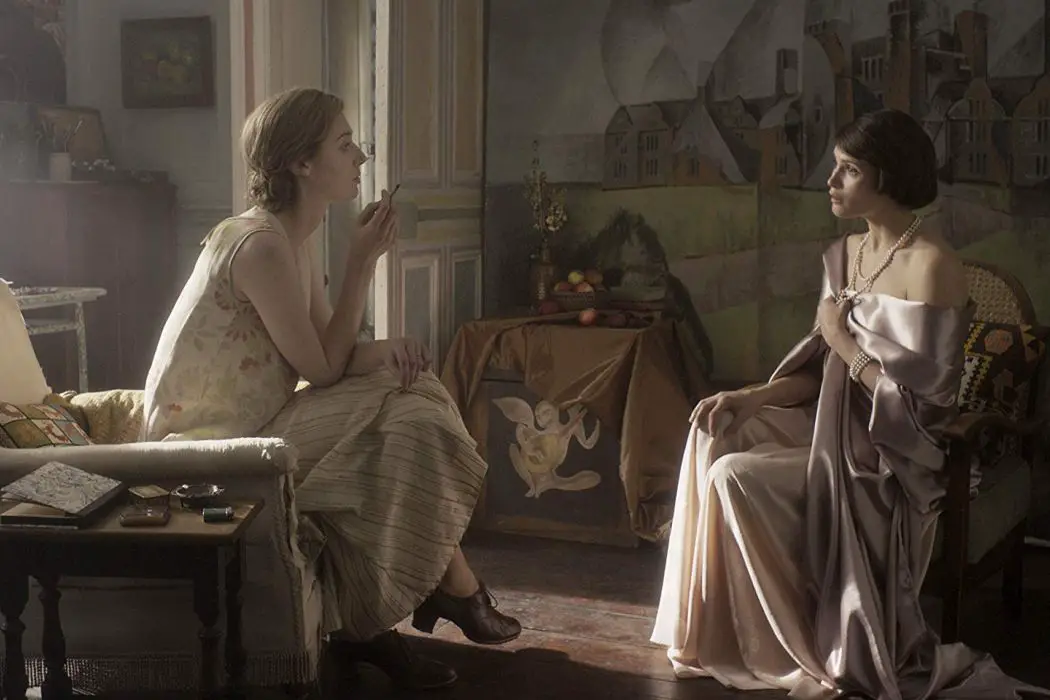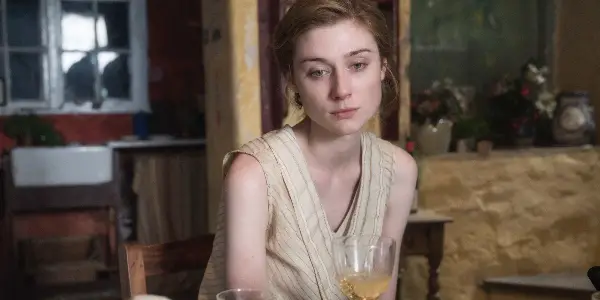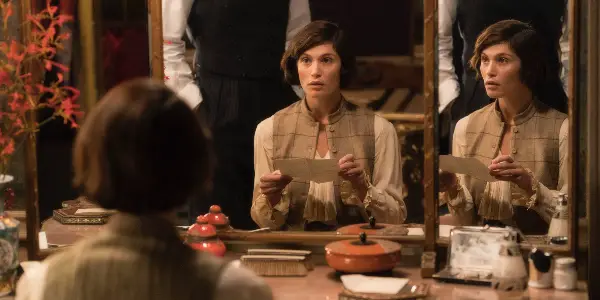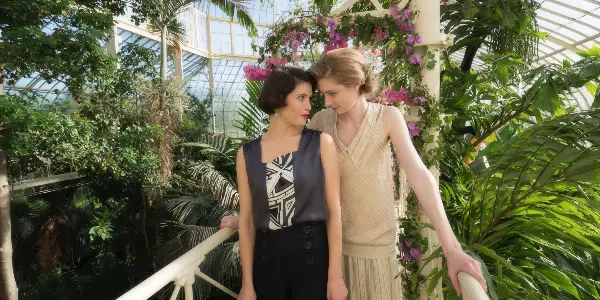VITA & VIRGINIA: A Dissapointing Emotional Conundrum

22. Film Critic and Journalist. Lover of Digital and Celluloid
Vita & Virginia, directed by Chanya Button, finds inspiration from a series of love letters between literary icons Virginia Woolf and Vita Sackville-West, written during their doomed affair. The film follows socialite Vita, who on a chance meeting becomes dazzled and transfixed on the enigmatic Virginia. Vita (Arterton) and Virginia (Debicki) begin a working relationship to distribute the former’s new book.
As the two begin to work together, they pick each other’s brains on all things writing and their respective sides of life, and the relationship soon delves into heightened sexual tension, threatening to spill over with severe consequences for all involved. On paper this is a sensually stoic and repressed love affair in an unforgiving era of class structure and ignorance. Sadly, the final product is an insufferable and void emotional conundrum, akin to something to the likes of Made in Chelsea.
Debicki Impresses
Elizabeth Debicki as Virginia Woolf is the only shining light of this subpar feature; she is stoic and powerful in how she exudes emotional torment. Steve McQueen’s Widows showcases Debicki talents, and her starring role as titular character Woolf is a continuation of her evolution. She embodies a richness of internal conflict; never outlandish or overly clear, never overstepping the mark of overindulging the character’s trials and tribulations. Debicki is convincing in evoking a restrained character, curating Woolf with a strong screen presence. She’s given most of what the screenplay can tentatively conjure up in layers and weight.
Debicki is clearly performing in a different film than everyone else. Vita & Virginia neglects to convey Woolf’s mental illness; it’s never clear within the film what Woolf is struggling with. The film itself merely showcases a doomed love affair and nothing else. Such a relevant and important thread is negated to background noise, rather than an integral key to exploring the complex persona of the icon. The rich touching material that is here is second billing to simplistic genre convention.

Arterton Underwhelms
Gemma Arterton, much-touted in the late 2000s, has in time underwhelmed in her acting credibility. The performance here by Arterton is tiresome and flat before the first twenty minutes are up, making the next hour and four minutes to be an excruciating chore to sit through. Arterton has little chemistry with her onscreen love interest. If such an integral element fails to conjure up a sense of passion or interest, Vita & Virginia ceases to suffice on even the basic level of what it wants to achieve.
Arterton’s filmography doesn’t showcase her terrific talent, albeit that isn’t to say that it doesn’t exist. Byzantium, The Girl With all the Gifts and Their Finest are a few examples of her best. Notably when working with interesting and abstract material. It’s unfortunately clear that she’s somewhat lost with where and why her character is heading. Failing to bring any personality or engaging nature to her character. Due to having one mode and a one-note conviction of cheerful commitment. Nothing more and nothing less.

Vita Sackville-West is a role best suited to the likes of Keira Knightley, an actress who has devoted her career performing as literary greats in films like Colette, and many other period dramas akin. Knightley succeeds in those films where Arterton fails. Not because of a distinctive difference in talent, but more so in comfortability and understanding of every small detail and element of their characters. Yet, Arterton can only bring so much to proceedings when the material is not up to par in the first place.
A Disastrous Screenplay
Writer Eileen Atkins botched the tone of the film, in the writing of Arterton’s character and crafting of the exploration of mental illness. Arterton is inadvertently, or not, the scapegoat for the failures of this feature. Due to the nature of the tone deaf screenplay Vita is written in the same vein as a horror antagonist in that of Fatal Attraction. She is needy, secretive, harmful, and toxic. Almost verging on exploitative for her own needs.
If the thread is appropriate to the story and the film acknowledges these elements then it could work. The audience could thus understand who to root for, and understand the toxicity that occurs, but the film never holds Vita accountable. It’s an open ended theme throughout that isn’t explored, nor defined, it’s more of an unfortunate oversight.
With the struggle of figuring out direction, the film travels its path regardless, without doing much of either exploration of themes. Weirdly, it is as if the film begins in the second act of a feature and not the first. You’re thrown into the proceedings without an inkling of when, where, or what is happening. It’s this pedantic proceeding that has its audience trying to catch up and fight against the tide from the get go. Tiring is perhaps an understatement to describe the pacing.
More Problems, Some Highlights
The film exercises an inorganic and estranged 80s synth score by composer Isobel Waller-Bridge, sister of Fleabag writer and star and Killing Eve writer Phoebe Waller-Bridge. In its own right the score is superb. It’s elegant, rousing and weighted with a clear vibrant energy. Yet, within the context of the feature is obtuse and out of place, with how the romantic beats occur. The film has identifiable rousing moments filled similar to TV tripe Made in Chelsea. Each bitterness-filled fight leads to a slow pan with the score raging on the in background, the camera lingering on its subject for a reaction shot. Rinse and repeat with every circumstance between the two titular characters. That is what essentially constructs Vita & Virginia.

While Vita & Virginia falls flat in most departments, but the production design by Noam Piper is extraordinary. There is a sense of warmth in every scene with the candle lit lighting. The tightness and claustrophobia of dining and working rooms feels raw and homely. The costumes are marvelous throughout. The wardrobe of Arterton’s character looks dazzling and beautifully crafted throughout the feature. All are vibrant and inviting. The cinematography by Carlos De Carvalho is superbly integrated into the mise-en-scene and subconsciously translates the mindset of the characters.
Vita & Virginia: Conclusion
The problems outweigh the impressive. The writing doesn’t even begin, nor intend, to discuss toxicity, proceeding instead as a simplistic mythical romanticised love affair. The film doubles down on her behaviour concerning her relationship with her husband, peers, and professional life, destroying all for her own gain.
Vita & Virginia is nothing short of a disaster in how it conveys its characters, plot and themes. It’s an insufferable venture that completely misses the mark, despite the strong material at its foundation that begs to be explored.
Have you seen Vita & Virginia yet? Were you enraptured with this sweet love affair or horrified with its handling? Let us know in the comments below!
Watch Vita & Virginia
Does content like this matter to you?
Become a Member and support film journalism. Unlock access to all of Film Inquiry`s great articles. Join a community of like-minded readers who are passionate about cinema - get access to our private members Network, give back to independent filmmakers, and more.













